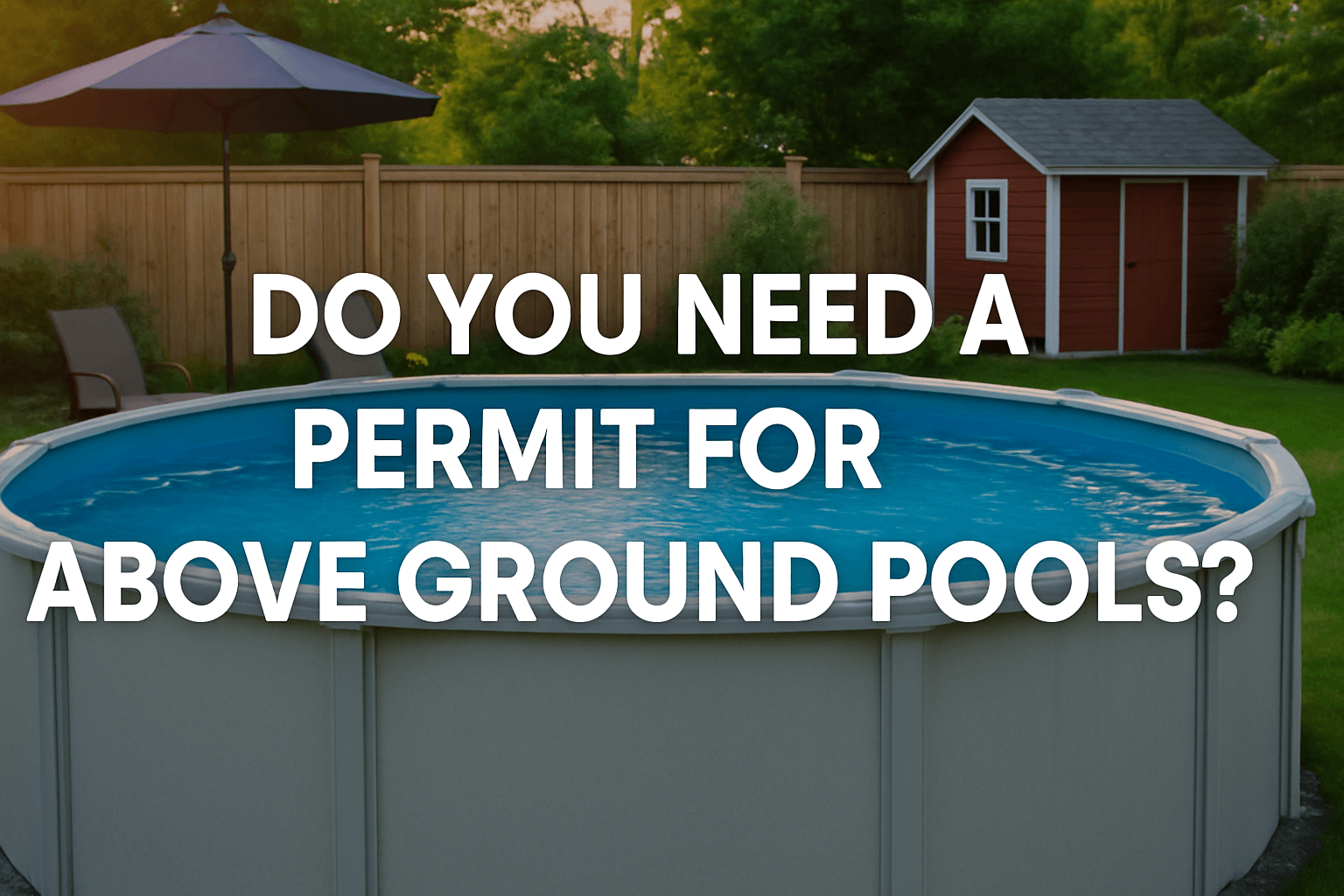
Do You Need A Permit For Above Ground Pools?
Dreaming of a garden pool but dreading red tape? Good news: you usually don’t need a permit for above ground pools in the UK—unless you’re in a conservation area or pushing planning limits. Want to dodge fines, neighbour drama, and surprise rules? Keep reading for the splashy details.
Understanding When Permits Are Required
Varying Local Regulations (City, County, State)
Putting up an above ground pool in your back garden sounds simple, right? And most of the time, it is. In many parts of the UK, you’re covered under what's called "permitted development"—as long as your pool ticks a few key boxes.
For example, the pool should be for private use, not built in a conservation area, and shouldn’t sit too close to your house or boundary. Live in a listed building or a protected area? You'll likely need to get official permission.
Local councils can vary in how they apply the rules, so a quick call to yours can save a summer of headaches.
Common Depth Triggers (e.g., 24 inches or more)
Some local authorities pay close attention to pool depth. While the UK doesn’t strictly follow the 24-inch rule seen in other countries, deeper pools may raise flags about safety or structural impact.
As a rule of thumb: the bigger or deeper the pool, the more likely it is someone will want a closer look.
Size and Volume of the Pool
Planning officers aren’t typically worried about a small paddling pool. But install something large enough to host the neighbours’ kids—and their inflatable flamingos—and you might need approval.
If your pool affects drainage or eats up too much garden space, it’s wise to check in with your local planning department.
Permanent vs. Temporary Structures
Seasonal pools that you pack away for winter? Usually no problem. But if you’re building a permanent structure—say, a pool with decking, filtration, or fencing—you’re moving into planning permission territory.
The more permanent it looks, the more likely it’ll need a permit.
Associated Construction (Decks, Electrical, Plumbing)
Adding decking? Installing lighting or a pump? These extras can trigger building regulations—even if the pool itself doesn’t.
Think of it like this: the more you build around it, the more the council will want to know.
Zoning and Setback Requirements
Some councils have rules about how close your pool can be to the boundary fence, footpath, or your neighbour’s prized rose garden. These setback requirements help prevent disputes and keep things safe.
If you're tight on space, always check the zoning rules first.

Types of Permits You Might Need
Building Permits (Structural Integrity, Safety Codes)
Even if planning permission isn’t needed, building control might still be involved. This is especially true for anything that could pose a risk—like raised decks, pool houses, or electrical fittings.
They'll want to know your build is safe, solid, and not about to collapse mid-cannonball.
Electrical Permits (for Pumps, Heaters, Lighting)
Planning to add a heater, pump, or underwater lights? These all involve electrics, and that means following Part P of the building regulations.
For your safety (and your insurance), a qualified electrician should handle this work and sign it off properly.
Plumbing Permits (for Drainage, Water Lines)
Connecting your pool to your main drainage or water system? That may mean a plumbing permit—especially if your setup could affect water flow or increase flood risk.
A simple above ground pool with a hose-fill is fine. But anything more involved? Best double-check.
Zoning/Location Permits (Ensuring Proper Placement)
Your pool’s location matters. Too close to boundaries or too visible from the street? That might be a zoning issue.
Some councils have rules about aesthetics or street-facing garden features—yes, even inflatable unicorns.

The Permit Application Process and Key Considerations
How to Determine Specific Local Requirements
Contacting Your Local Building Department or Planning Office
This is your first stop. A quick phone call or email can clear up a lot of confusion.
They’ll let you know if your plans need permission—or if you're good to go.
Checking Online Municipal Resources
Many councils offer online planning portals with forms, fee calculators, and handy guides. If you're not sure where to start, try the UK Government’s Planning Portal.
It’s a bit like online shopping—but for paperwork.
Consulting with a Reputable Pool Contractor
Good installers know the local rules. Better yet, many will handle the red tape for you.
That means fewer forms, less guessing, and more time planning your first splash.
Steps to Obtain a Permit
Required Documentation (Site Plans, Pool Specifications, Drawings)
When applying, you’ll usually need a site plan showing where the pool will go, how big it is, and what extras (like decking or pumps) you’re adding.
Photos, product sheets, and manufacturer specs can all help speed things along.
Application Submission and Fees
Send your paperwork to your local council with the correct fee—usually between £200 and £500, depending on complexity.
Once submitted, you’ll get a reference number to track your application.
Necessary Inspections (Rough-in, Final)
Some builds require inspections during and after installation—especially where electrics or structural elements are involved.
Don’t skip them! It’s not just about ticking boxes—it’s about safety.
Consequences of Not Obtaining a Permit
Fines and Legal Penalties
Ignore the rules, and it could cost you. Councils can issue fines up to £5,000—or more in serious cases.
They might even take you to court.
Forced Removal or Demolition of the Pool
Yes, this really happens. If your pool breaks planning laws or causes complaints, the council can make you remove it.
It’s not a fun way to end the summer.
Issues with Homeowner's Insurance and Property Resale Value
Non-compliant pools can void your home insurance. Worse, they can make selling your home harder later.
No one wants to find out during a buyer's survey that the pool has to go.

Beyond Permits: Comprehensive Safety and Installation Tips
Importance of Pool Fencing and Barriers (Often Permit-Related)
Compliance with Barrier Height and Gate Specifications
Most councils recommend fencing—even if it’s not strictly required. A fence helps prevent accidents and keeps unsupervised children (and curious pets) out.
Check local specs for things like gate height and latch systems.
Child Safety Features (Alarms, Self-Latching Gates)
If you’ve got young kids, consider extra safety measures. Pool alarms, non-climb fencing, and self-latching gates can save lives.
They also show inspectors—and insurance providers—you’re serious about safety.
Ensuring Proper Site Preparation
Level Ground and Stable Foundation
Pools don’t like slopes. A tilted pool can strain the frame, flood your garden, or even tip over.
Use compacted, level ground or a proper base to keep everything stable.
Drainage Considerations
Heavy rain or overflows can turn your garden into a swamp. Make sure your site has proper drainage so water can run off safely.
It’ll keep your lawn (and your neighbours’ lawn) intact.
Maintaining Ongoing Compliance
Adhering to Approved Plans
Once your plans are approved, stick to them. Swapping a small pool for a monster one might land you back in hot water.
If you need to make changes, get them signed off first.
Scheduling Required Inspections
Keep track of any required check-ins during or after the build. Skipping them could delay your sign-off—or lead to penalties.
Better safe than sorry.
Understanding Permit Expiration Dates
Most permits don’t last forever. If your project stalls or gets delayed, check the expiry date.
You may need to renew or reapply to stay compliant.
A garden pool is one of life’s little luxuries—especially on a sunny UK afternoon. But rules are rules, and cutting corners can lead to big problems.
Play it smart, follow the process, and you’ll be splashing around stress-free in no time.
Have you checked out our other posts?
Do Above Ground Pools Need A Fence?
Do Above Ground Pools Need Planning Permission?
Can You Have An Above Ground Pool Without A Fence?


Leave a comment